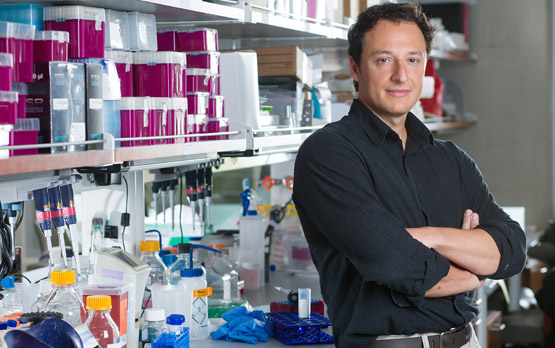On March 19th we held a special Facebook Live “Ask the Stem Cell Team About Autism” event. We were fortunate enough to have two great experts – Dr. Alysson Muotri from UC San Diego, and CIRM’s own Dr. Kelly Shepard. As always there is a lot of ground to cover in under one hour and there are inevitably questions we didn’t get a chance to respond to. So, Dr. Shepard has kindly agreed to provide answers to all the key questions we got on the day.
If you didn’t get a chance to see the event you can watch the video here. And feel free to share the link, and this blog, with anyone you think might be interested in the material.

Can umbilical cord blood stem cells help reduce some of the symptoms?
This question was addressed by Dr. Muotri in the live presentation. To recap, a couple of clinical studies have been reported from scientists at Duke University and Sutter Health, but the results are not universally viewed as conclusive. The Duke study, which focused on very young children, reported some improvements in behavior for some of the children after treatment, but it is important to note that this trial had no placebo control, so it is not clear that those patients would not have improved on their own. The Duke team has moved forward with larger trial and placebo control.
Does it have to be the child’s own cord blood or could donated blood work too?
In theory, a donated cord product could be used for similar purposes as a child’s own cord, but there is a caveat- the donated cord tissues must have some level of immune matching with the host in order to not be rejected or lead to other complications, which under certain circumstances, could be serious.
Some clinics claim that the use of fetal stem cells can help stimulate improved blood and oxygen flow to the brain. Could that help children with autism?
Fetal stem cells have been tested in FDA approved/sanctioned clinical trials for certain brain conditions such as stroke and Parkinson Disease, where there is clearer understanding of how and which parts of the brains are affected, which nerve cells have been lost or damaged, and where there is a compelling biological rationale for how certain properties the transplanted cells, such as their anti-inflammatory properties, could provide benefit.

In his presentation, Dr. Muotri noted that neurons are not lost in autistic brains, so there is nothing that would be “replaced” by such a treatment. And although some forms of autism might include inflammation that could potentially be mitigated, it is unlikely that the degree of benefit that might come from reducing inflammation would be worth the risks of the treatment, which includes intracranial injection of donated material. Unfortunately, we still do not know enough about the specific causes and features of autism to determine if and to what extent stem cell treatments could prove helpful. But we are learning more every day, especially with some of the new technologies and discoveries that have been enabled by stem cell technology.
Some therapies even use tissue from sheep claiming that a pill containing sheep pancreas can migrate to and cure a human pancreas, pills containing sheep brains can help heal human brains. What are your thoughts on those?
For some conditions, there may be a scientific rationale for how a specific drug or treatment could be delivered orally, but this really depends on the underlying biology of the condition, the means by which the drug exerts its effect, and how quickly that drug or substance will be digested, metabolized, or cleared from the body’s circulation. Many drugs that are delivered orally do not reach the brain because of the blood-brain barrier, which serves to isolate and protect the brain from potentially harmful substances in the blood circulation. For such a drug to be effective, it would have to be stable within the body for a period of time, and be something that could exert its effects on the brain either directly or indirectly.
Sheep brain or pancreas (or any other animal tissue consumed) in a pill form would be broken down into basic components immediately by digestion, i.e. amino acids, sugars, much like any other meat or food. Often complex treatments designed to be specifically targeted to the brain are delivered by intra-cranial/intrathecal injection, or by developing special strategies to evade the blood brain barrier, a challenge that is easier said than done. For autism, there is still a lot to be learned regarding how a therapeutic intervention might work to help people, so for now, I would caution against the use of dietary supplements or pills that are not prescribed or recommended by your doctor.
What are the questions parents should ask before signing up for any stem cell therapy
There is some very good advice about this on the both the CIRM and ISSCR websites, including a handbook for patients that includes questions to ask anyone offering you a stem cell treatment, and also some fundamental facts that everyone should know about stem cells. https://www.closerlookatstemcells.org/patient-resources/
What kinds of techniques do we have now that we didn’t have in the past that can help us better understand what is happening in the brain of a child with autism.
We covered this in the online presentation. Some of the technologies discussed include:
– “disease in a dish” models from patient derived stem cells for studying causes of autism
– new ways to make human neurons and other cell types for study
– organoid technology, to create more realistic brain tissues for studying autism
– advances in genomics and sequencing technologies to identify “signatures” of autism to help identify the underlying differences that could lead to a diagnosis
Alysson, you work with things called “brain organoids” explain what those are and could they help us in uncovering clues to the cause of autism and even possible therapies?
We blogged about this work when it was first published and you can read about it on our blog here.
Do you think organoid models will become more common for autism in the future? Really fascinating work guys – NeuronaHealth.com
Absolutely, they give you a human model to test out therapies and ideas, so much better than a mouse model.